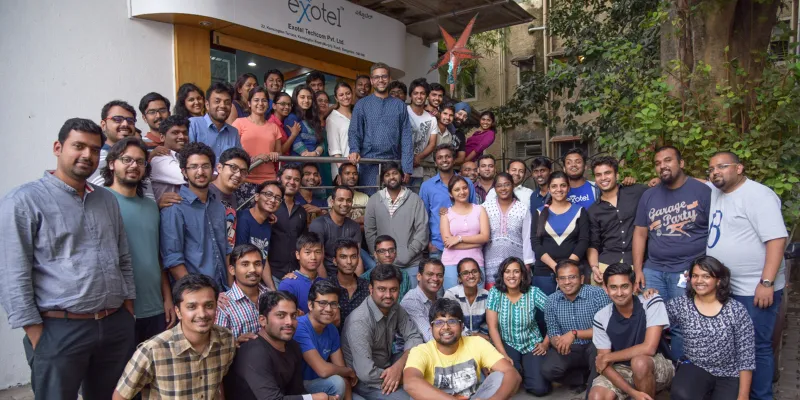In a world of AI and chatbots, why bootstrapped Exotel believes conversations will always thrive
Exotel is a Cloud Telephony platform that helps companies manage their customer communication over voice calls and messages.
At a glance:
Startup: Exotel
Founders: Shivakumar Ganesan
Founded in which year: 2011
Sector: Cloud Telephony
Based out of: Bengaluru
Funding: Bootstrapped
Human communication has drastically changed and improved over the years and have become seamless and quicker, more so in the enterprise world.
From telephone calls, pagers and faxes, technology has moved ahead and increased the quality of human interaction with e-mails, SMS’s, IVRS, and chatbots.
While voiceless communication that include chatbots and messages are growing and taking over the way we communicate, voice calls and communications still play a significant part.
Hence, cloud telephony still plays a significant role in enterprise communications.
“Voice will always be a significant part of communication. There will always be a need to talk to people in remote areas. Phone calls will always be the least common denominator when it comes to addressing interactions,” says Shivakumar Ganesan, Founder and CEO, Exotel.
Exotel is a cloud telephony platform, which helps companies manage their customer communication over voice calls and messaging.
“Think of us as a software interface in a telecommunications company. Instead of a business having to worry about telephonye lines and other infrastructure, all it needs to do is interface with us via APIs (Application Program Interface) and a browser. We take all the complexities of the underlying telecom infrastructure and provide them simple software interface,” explains Shivakumar.

The world of connections
Exotel began operations way before the term ‘cloud telephony’ was spoken about in India. Shivakumar, with his earlier startup had noticed firsthand how difficult enterprise communication could be. It is the core of any organisation and yet many parts are broken and need to be fixed.
Cloud telephony can offer the complete package of hardware, which can be automated for certain features like caller identification, and call waiting at a fraction of the cost of a traditional PSTN (Public Switched Telephone Network).
When Shivakumar started Exotel, his idea was to replace EPABX (Electronic Private Automatic Branch Exchange) with cloud telephony. EPABX is a private branch exchange, a telephone exchange that serves or operates a particular business or office.
“The idea was to marry telecommunications with a software mindset. However, we had an idea of software technology and didn’t know much about the telecom industry. In my naivety, I had believed all communication could be on cloud,” says Shivakumar.
Cloud telephony, though, is not just confined to VoIP (Voiceover Internet Protocol), but also caters to PSTN, which is largely employed by a majority of offices in the country. A word of caution here: Voice over Internet Protocol has legal restrictions in India, hence limiting the scope of services that Cloud Telephony can offer.
Product evolution through stages
However, before Exotel could work via APIs, it went through different phases. Starting as a SaaS (Software as a Service) tool where conversations between companies and customers can be enabled and customised for different functions and kinds of communications. The idea of API’s came to combat regulatory ambiguity
Exotel’s first customer was a startup that connected English teachers from metro cities to people who wanted to learn the languate in Tier 2 and Tier 3 cities.
“The market helped us discover our own powers. The power of the platform was shown to us by Ola,” says Shivakumar.
Four years back, the market was going through a major change, and digital transformations were changing the way things functioned. Shivakumar explains back then food delivery via an app was an unheard of concept. Today the things are different.
“Therefore, the need for a platform or product that can communicate with a customer becomes imperative. When a customer orders from Flipkart, there are six or seven different parties involved that ensure your product reaches you on time. And in case of any kind of discrepancy, one of the easiest and assured ways of reaching a customer is through a phone call,” explains Shivakumar.

What it does
In its simplest form, businesses can use Exotel to handle your customer calls, divert it to your team, get them to perform actions based on directions over an IVR, etc.
According to Shivakumar, almost every form of communication is going to be wired by software and Exotel is selling these API.
The business model of the company is “pay as you use” and this lends a flexible and dynamic business model. From 2011, the business model has evolved significantly. Currently the team works around a recurring and transactional model of payments.
While the team hasn’t shared the average value or costs, Exotel claims to have over four million calls a day across seven countries and close to 4,000 of these concurrently.
The cloud telephony platform manages different kinds of communications for the organisations - voice or text and even an interplay and mix of the two.
The team adds that the technology infrastructure performs communication functions at the ease and convenience of companies. According to the regulatory filing shared by the company, the total revenues of Exotel in financial year 2016-17 was at Rs 398,391,253 with a profit of Rs 42,918,478.
“We are the lego of customer communication. Enterprises can use our APIs to devise their customer communication in a way that works best for their business. Cab aggregators use it to connect drivers and riders, marketplaces use it connect customers with the best vendors available, third party delivery companies use it to make automated calls to confirm the customers’ availability,” says Shivakumar.
The market
Cloud Telephony in the past few years has almost replaced the conventional business telephone equipment like PBX, with third-party VoIP service, making voice communication cost-effective.
According to an Ernst & Young report, the domestic BPO market size is at $6 billion. The Indian government is also contemplating a policy that encourages domestic BPOs to move to Tier 2 and 3 cities to generate employment.
The growth in the domestic BPO market will directly impact the Cloud Telephony sector in the country. Players like Ozonetel, Knowlarity, VoiceTree, Sonetel, MyOperator, and Sipper Global Informatics seem to be in a tug-of-war to grab a share of this pie.
However, Cloud Telephony in India also faces several regulatory challenges. Shivakumar adds that telecom has long become a commodity and unfortunately price is positioned as a prime differentiator across the world in this space. Margin is an inevitable question for a telephone platform.
However Shivakumar is optimistic about his business poised for growth. The company is aiming to onboard more customers and look at different modules where communication tools can be a driving force for businesses worldwide.







